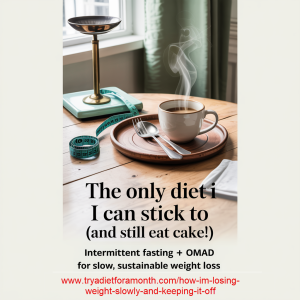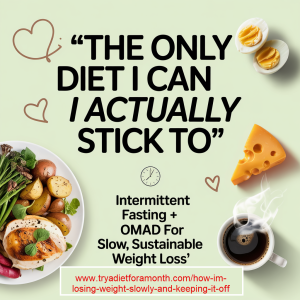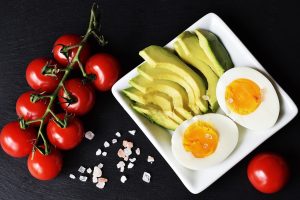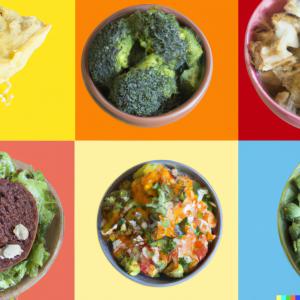This article does NOT provide medical advice
This article may contain affiliate links
The Best Diet is the One You Can Stick To
Introduction: Why Most Diets Don’t Last
 If you’ve tried countless diets, only to find the weight creeping back on, you’re not alone. Many of us lose weight successfully — only to regain it when the diet ends. And as we get older, shedding extra pounds feels even harder.
If you’ve tried countless diets, only to find the weight creeping back on, you’re not alone. Many of us lose weight successfully — only to regain it when the diet ends. And as we get older, shedding extra pounds feels even harder.
The real challenge isn’t just losing weight — it’s finding a way of eating you can realistically stick with for life.
A Sustainable Weight Loss Plan That’s Actually Doable
After years of trial and error, I’ve found a method that’s working for me: a blend of intermittent fasting (18:6) and elements from The Carbohydrate Addict’s Diet (OMAD principles). It’s simple, structured, and most importantly — sustainable.
What is Intermittent Fasting (18:6)?
Intermittent fasting (IF) involves eating within a set time window each day and fasting outside of it. I follow an 18:6 pattern, meaning I eat between 1pm and 7pm and fast the remaining 18 hours.
Benefits of intermittent fasting:
-
Supports steady fat loss
-
Reduces hunger hormones over time
-
Simplifies meal planning
-
May improve metabolism and energy levels
How I Combined Intermittent Fasting with OMAD Principles
While OMAD (One Meal A Day) traditionally means eating one large meal within a one-hour window, I adapted it slightly. I have:
-
A small, satisfying meal at 1pm
-
A main meal at 6pm
-
No grazing between meals
This approach follows the Carbohydrate Addict’s Diet’s idea of reward meals — where you enjoy higher-carb treats as part of your dinner, preventing cravings later on.
How I Eased Into This Way of Eating
Starting intermittent fasting isn’t always easy, especially if you’re used to eating breakfast. To help adjust:
-
I had a teaspoon of full-fat cream cheese when hunger struck in the morning.
-
Gradually, my body adapted to eating only after 1pm.
Now my day looks like this:
1pm Meal:
-
2 hard-boiled eggs
-
A chunk of extra mature cheddar
-
Coffee (black or with a splash of cream)
6pm Dinner:
-
Meat or fish
-
Potatoes
-
2 vegetables (such as carrots and broccoli)
-
2–3 dessertspoons of crunchy almond nut butter (to make sure I get enough fiber) Dieting can often bring the miseries of constipation. If nut butters aren’t your thing, check this article for adding fiber to your diet.
-
Optional treat: a slice of cake or bread (after the main meal)
No eating between these times. No grazing.
Why This Diet Plan Works
This combination of intermittent fasting and OMAD-inspired approach works for a few key reasons:
-
Structured but flexible: You have clear meal times and rules, but treats are allowed in moderation.
-
Prevents constant hunger: High-fat, protein-rich foods keep you fuller for longer.
-
Reduces cravings: Avoiding constant blood sugar spikes makes it easier to resist snacks.
-
Encourages mindful eating: You learn to listen to your hunger cues and eat with intention.
Finding a Weight Loss Plan You Can Stick To
It’s important to remember that no single diet fits everyone. What feels easy for one person might be difficult for another. Some thrive on low-carb diets, others prefer calorie tracking, Mediterranean diets, or plant-based plans.
The key to long-term weight loss success is finding a method you can live with — not just for a few weeks, but for the long haul.
Tips for Choosing a Sustainable Diet
-
Start gradually — small changes are easier to maintain.
-
Choose foods you enjoy.
-
Allow occasional treats to avoid feeling deprived.
-
Focus on health, not just weight.
-
Make it fit your lifestyle and schedule.
Final Thoughts: Slow and Steady Wins the Race
Losing weight slowly is often the most sustainable way. By making manageable adjustments — like intermittent fasting combined with balanced meals — you can create a way of eating that promotes weight loss and still lets you enjoy life.
If you’re searching for a diet you can stick to, this gentle, flexible approach might just be what you’ve been looking for.




